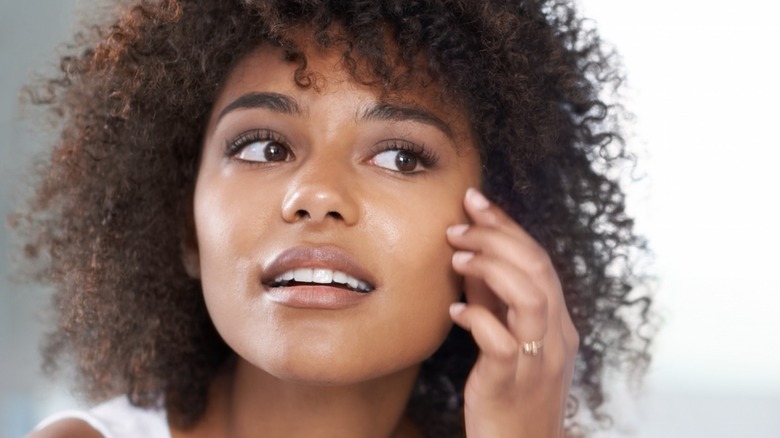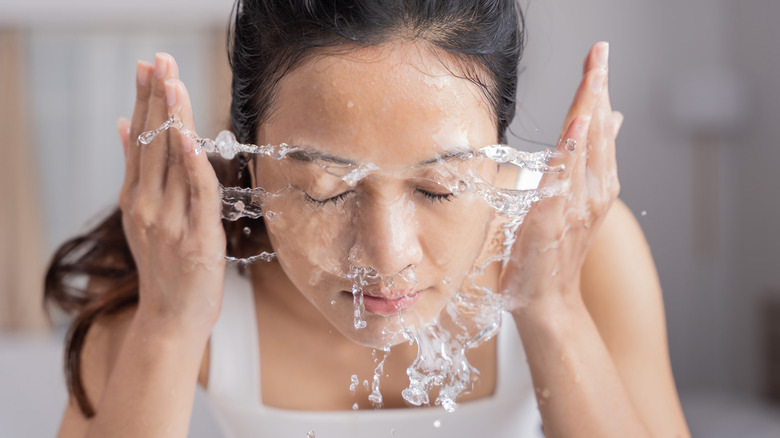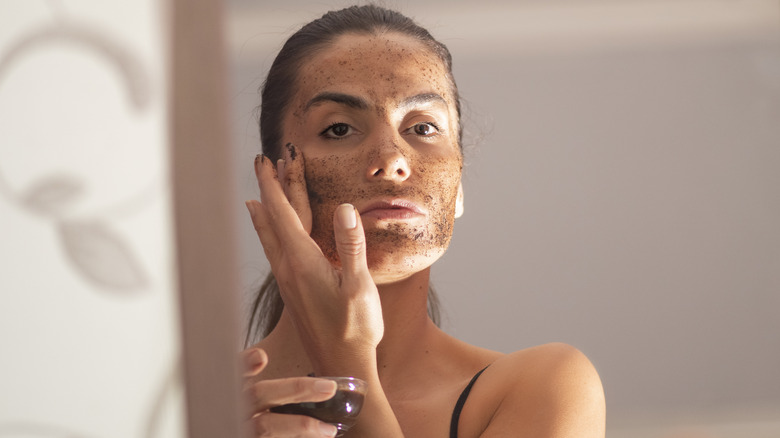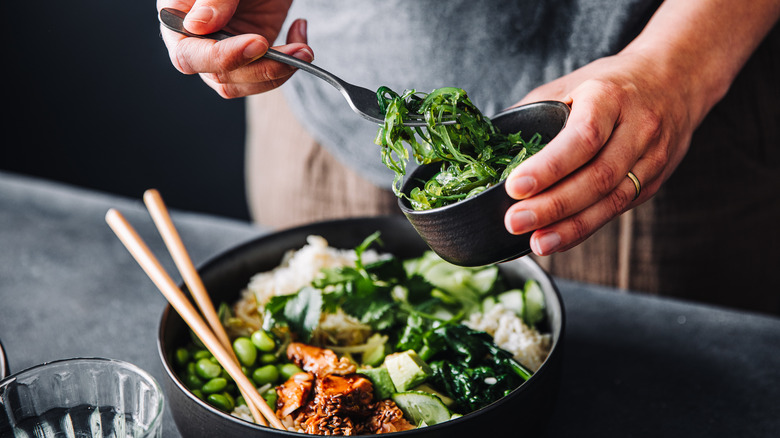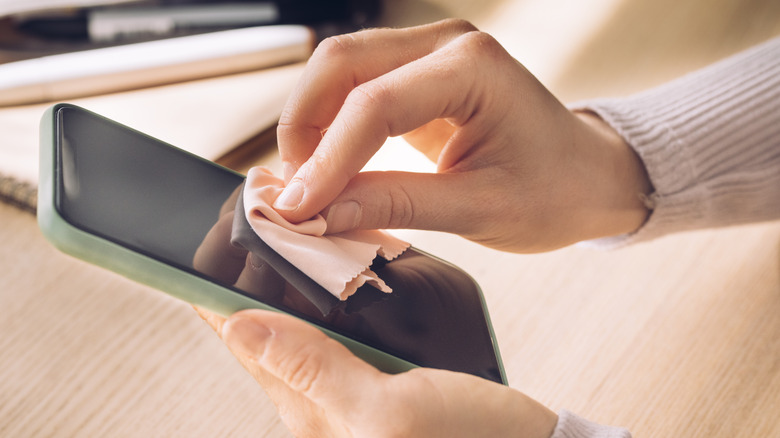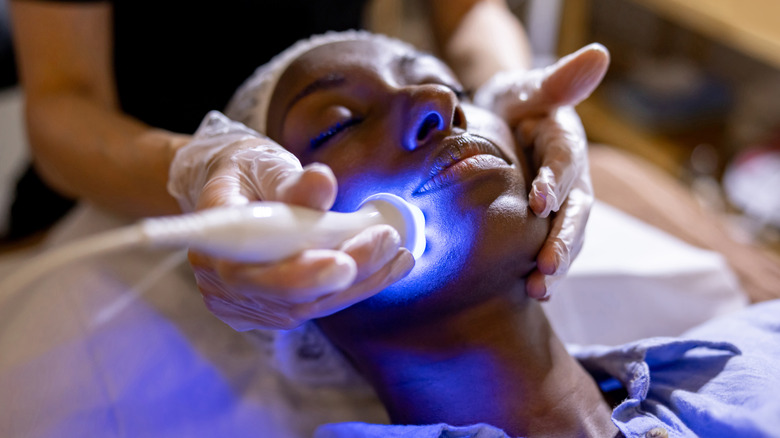Easy Tips For Preventing Stubborn Blackheads
You might think one benefit of getting older is outgrowing the pains of acne. The thing is, this skin condition can persist even in middle age. In fact, more adults are suffering from it at an increasing rate according to the American Academy of Dermatology Association. Even worse, per Dermatology Advisor, women are 1.3 times more prone to it.
This explains why you might still spot blackheads on your face as a grownup. A type of acne referred to medically as open comedones, blackheads are caused by follicles that get clogged with dead skin cells and an oily, waxy substance called sebum. Although it functions to moisturize and protect the skin, increased production of sebum contributes to acne development.
A common misconception about blackheads is that the black dots that give them their name are trapped dirt. However, as clarified by Verywell Health, these dots are the aforementioned dead skin cells and sebum that have turned dark after getting exposed to air through the width of the follicle openings. This chemical reaction, called melanin oxidation, is the main difference between blackheads and whiteheads, with the latter known as closed comedones.
Even when you're working on adopting a more neutral attitude toward acne, having blackheads can feel unsettling. Aside from the stigma caused by the fallacy regarding their cause, they simply look unsightly. Since prevention is always best when it comes to skincare, optimize your beauty routine to include products and extra steps that'll help keep your face blackhead-free.
Observe the basics of proper skincare
Even though blackheads aren't caused by dirt that gets trapped in the pores, that doesn't mean foregoing the usual step of cleansing the skin daily. To specifically keep blackheads at bay, use a facial wash that's formulated to prevent the buildup of dead skin cells and sebum. Healthline recommends looking for one with salicylic acid or retinoids, as these have acne-fighting properties. However, those with sensitive skin might find these ingredients too harsh and drying. In particular, while retinoids facilitate skin cell turnover, certain types such as tazarotene have been discovered to increase UV sensitivity. Pregnant people or those who plan on becoming pregnant are also advised to avoid retinoid use since exposure raises the risk of miscarriage or birth defects.
Instead, dermatologist Dr. Deanne Mraz Robinson suggested using a cleanser with gentle glycolic acid. She explained to Glamour that this milder formulation cleans the skin without stripping it of moisture and without triggering the over-production of sebum, which is often the case when the skin gets too dry. It also helps if the product has hydrating ingredients like glycerin and sorbitol that, according to her, "act as humectants and help your skin retain moisture."
Speaking of moisture, don't skip applying moisturizer even if you have oily skin. Dr. Jessica Weiser suggested (per Teen Vogue) using a "lightweight pH-balanced moisturizer" that hydrates the skin without clogging your pores. Don't forget to protect your skin from the sun, too, with an oil-free, non-comedogenic sunscreen.
Practice certain skincare habits in moderation
Since the accumulation of dead skin cells is a factor in the development of blackheads, regular exfoliation must be part of your skincare routine. There is such a thing as over-exfoliation, though, and it does more harm than good. Using either a facial scrub or a wash formulated with alpha, beta, and polyhydroxy acids every day can lead to dryness, which, as already mentioned, triggers the sebaceous glands to produce too much sebum. Instead, follow Dr. Weiser's advice in Teen Vogue to exfoliate no more than three times a week. If you're using a physical exfoliant, avoid rubbing the granules aggressively against your face. Also, if you are exfoliating more than once a week, give your skin a rest in between sessions.
You've also probably heard of blackhead masks. These are facial masks that have exfoliating and acne-fighting functions. Dermatologist Howard Sobel explained to Elle how chemical exfoliators in their formula help dissolve already-existing blackheads, adding that "... with continued use, blackheads can improve, and ultimately be prevented in the future." There's no harm in trying them out, but be advised that the skincare benefits of facial masks are supported only by anecdotal evidence so far, as Healthline noted. Do a patch test as well before using any new mask to ensure that it doesn't dry or irritate your skin. Should you find one that proves effective for you, use it no more than twice a week, preferably after exfoliation.
Be more mindful of your diet
Good news if you love chocolate: The National Library of Medicine cleared it as a cause of acne breakout. However, a 2020 study discovered a correlation between the consumption of "milk, sugary beverages, and fatty and sugary products" and the occurrence of acne among adults. Another food item to watch out for? Beef. It's rich in leucine, an amino acid that, according to research, activates the mammalian target of rapamycin complex 1 (mTORC1), a complex protein that's naturally present in the body. As important as leucine is to muscle growth (per MindBodyGreen), Verywell Health warns that an over-activated mTORC1 could result in inflammation, elevated sebum production, and increased androgen hormones — all factors that contribute to acne.
But before you eliminate all red meat, sugar, and dairy from your meal plan, consider that there's no definitive consensus yet on the actual connection between diet and the development of acne; the 2020 study itself concluded that further, wider-scale research needed to be done. It's still smart, though, to avoid food items you've personally observed to have adverse effects on your skin, from inflammation to heightened oil production. Consulting a dermatologist can shed more light on this.
Consuming more anti-inflammatory foods is also great for your overall health. Dr. Weiser told Teen Vogue that eating nutrient- and antioxidant-packed leafy greens and brightly colored produce can improve the quality of your skin. "[Studies] have shown acne patients have higher oil production and lower antioxidant levels," she added.
Clean the stuff that's often in contact with your skin
We already know the usual tips on keeping our skin clear: Don't go to sleep with makeup on, take a post-workout shower to wash away sweat and dirt, and avoid touching your face — much less picking at your blemishes.
What we might not pay enough attention to is how breakout-causing bacteria also builds up on the materials that touch our face with frequency: face masks, makeup tools, pillowcases, beddings, towels, yoga mats, hats, headbands, phone screens, etc. If you use over-the-ear headphones, for example, consider how your temples, ears, and sides of the cheeks get compressed against them. The combination of sweat, friction, and heat — especially for long durations — triggers a specific type of breakout. "Any item that is touching the skin for a continuous period of time can cause acne mechanica," dermatologist Dr. Courtney Rubin explained to Teen Vogue. The more frequently you use an item, the more often you should wash and disinfect it from the buildup of bacteria, dead skin cells, oil, sweat, and dirt. For non-washable materials, clean them with antibacterial wipes after use, especially when you use them while doing strenuous activities.
Keep an eye on your makeup and haircare products too. The latter in particular are possible culprits for breakouts on the forehead. Switch to non-comedogenic beauty supplies so they're less likely to clog your pores. Throw out makeup items that are more than a year old (three months for eyeliners and mascara).
What to do when you get blackheads?
Sometimes, our best efforts can't keep blackheads away permanently, thanks to genetics and hormonal fluctuations that affect the skin's oil production. When you spot these black dots on your skin, you might be tempted to do home remedies: applying clay masks and green tea-infused creams, steaming, and exfoliation. However, Verywell Health cautions that these DIY methods' effectiveness isn't backed by science. Worse, your at-home treatment might aggravate your skin and leave it infected or more prone to breakouts.
Playing the waiting game while maintaining your skincare regimen might be better. "Some blackheads may go away on their own, especially if they are located close to the surface of the skin," dermatologist Dr. Ife J. Rodney told MindBodyGreen. Let your skin generate new cells and discard old ones at its pace, and it will cast off the buildup in its pores sooner or later. In case you develop the type that's embedded deep in the skin — or if you simply want your blackheads gone ASAP — visit a dermatologist. They will know better whether you need an extraction, microdermabrasion, or a prescription for acne medication. They can also advise you on which OTC treatment to get and how to use it for future breakouts.
At the end of the day, blackheads happen due mostly to factors we can't control. We can do our part by being consistent with our skincare habits, but getting a blackhead or two isn't the end of the world.
